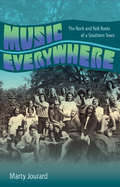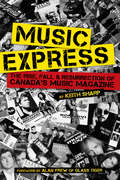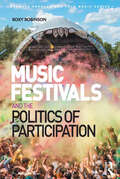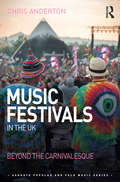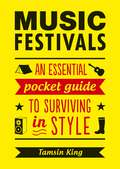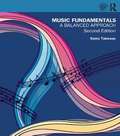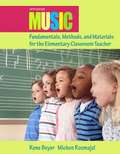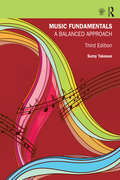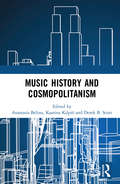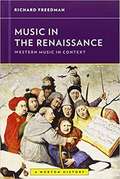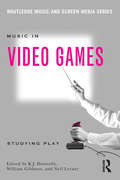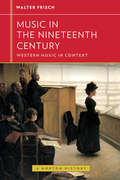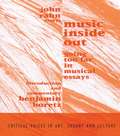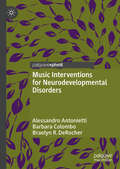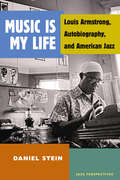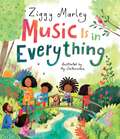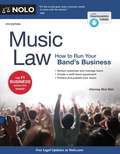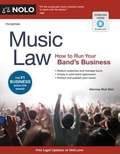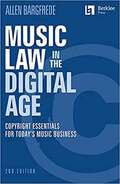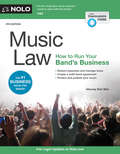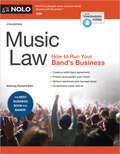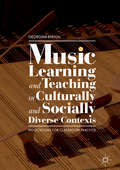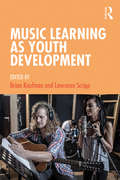- Table View
- List View
Music Everywhere! (Global Fund for Children Books)
by Maya Ajmera Cynthia Pon Elise Hofer DerstinePhotographs from around the world celebrate the universal joy that kids get from making music, whether they’re playing instruments, clapping their hands, stomping their feet, or singing. Music can help express one child’s feelings—or it can bring a whole community together.
Music Everywhere: The Rock and Roll Roots of a Southern Town
by Marty Jourard“A highly entertaining, well-written look at a city that played a major role in the history of rock and roll music. Kudos to Marty Jourard on a book of historical importance.”—Kudzoo Magazine “Jourard tells the story so that you feel you are there in the humid clubs watching history unfold in a time when regional music scenes truly were unique.”—Charles R. Cross, author of Heavier Than Heaven: A Biography of Kurt Cobain “Jourard clearly demonstrates that Gainesville’s contributions are no less vital than those of New York City, Chicago, Memphis, Los Angeles, Seattle, and so many more.”—Marc Eliot, author of To the Limit: The Untold Story of the Eagles “A musical rags-to-riches story that you can dance to. Here’s the story of a little southern town that made a big impact on American music.”—WilliamMcKeen, editor of Homegrown in Florida “Gainesville is a key destination in central and north-central Florida’s growing reputation as America’s foremost incubator for important guitarists of rock and roll: Petty, Felder, Stills, Allman, Betts, Dudek, Rossington, Parsons, Campbell, and Leadon among many others. Jourard, himself part of Gainesville’s music history alongside members of his hit-making band the Motels, deserves accolades for his immersive exploration of his hometown’s myriad contributions to rock history.”—Bob Kealing, author of Calling Me Home: Gram Parsons and the Roots of Country Rock “From Stephen Stills to the Certain Amount, from Leadon and Felder to Sister Hazel, from hootenannies to the Heartbreakers to everyone in between, this is the story of a place called Gainesville and its ever-enduring songs of the South.” —Jeff Lemlich, author of Savage Lost: Florida Garage Bands; The ’60s and Beyond When the Beatles launched into fame in 1963, they inspired a generation to pick up an instrument and start a band. Rock and roll took the world by storm, but one small town in particular seemed to pump out prominent musicians and popular bands at fac¬tory pace. Many American college towns have their own story to tell when it comes to their rock and roll roots, but the story of Gainesville, Florida, is unique: dozens of resident musicians launched into national prominence, eight inducted into the Rock and Roll Hall of Fame, and a steady stream of major acts rolled through on a regular basis. From Tom Petty and the Heartbreakers to Stephen Stills and the Eagles’ Don Felder and Bernie Leadon, Gainesville cultivated some of the most celebrated musicians and songwriters of the time. Marty Jourard—a member of the chart-topping band the Motels—delves into the individual stories of the musicians, businesses, and promoters that helped foster innovative, professional music and a vibrant creative atmosphere during the mid-sixties and seventies. The laid-back southern town was also host to a clash of cultures. It was home to intellectuals and rednecks, liberals and conservatives, rac¬ists and civil rights activists, farmers, business¬men, students, and hippies. Although some¬times violent and chaotic, these diverse forces brought wild rock and roll energy to the music scene and nourished it with an abundance of musical fare that included folk, gospel, soul, country, blues, and Top Forty hits. Gainesville musicians developed a sound all their own and a music scene that, decades later, is still launch¬ing musicians to the top of the charts. Music Everywhere brings to light a key chapter in the history of American rock and roll—a time when music was a way of life and bands popped up by the dozen, some falling by the wayside but others leaving an indelible mark. Here is the story of the people, the town, and a culture that nurtured a wellspring of talent.
Music Express: The Rise, Fall & Resurrection of Canada's Music Magazine
by Keith Sharp Alan FrewThe glory days of rock from the perspective of Canada’s original music magazine. The story of Music Express is told through the unique perspective of Keith Sharp, the magazine’s founder and editor. During its seventeen-year existence, Music Express rose from a small, Calgary-based regional magazine to an international publication. The interviews, anecdotes, and stories cover the golden era of Canadian music, with the rise to global status of such icons as Bryan Adams, Loverboy, Rush, Celine Dion, and Triumph. Their stories, as well as many more, are captured together with an array of classic rock photography that provides a unique time capsule. From Sharp’s Calgary roots in 1976 to the heady heights of his publication’s growth, he details foreign adventures covering the likes of David Bowie in Australia, KISS in West Germany, and Iron Maiden in Poland, along with other high-profile interviews including U2, Paul McCartney, Iron Maiden, and Rod Stewart.
Music Festivals and the Politics of Participation (Ashgate Popular and Folk Music Series)
by Roxy RobinsonThe spread of UK music festivals has exploded since 2000. In this major contribution to cultural studies, the lid is lifted on the contemporary festival scene. Gone are the days of a handful of formulaic, large events dominating the market place. Across the country, hundreds of ’boutique’ gatherings have popped up, drawing hundreds of thousands of festival-goers into the fields. Why has this happened? What has led to this change? In her richly detailed study, industry insider Dr Roxy Robinson uncovers the dynamics that have led to the formation and evolution of the modern festival scene. Tracing the history of the culture as far back as the fifties, this book examines the tensions between authenticity and commerce as festivals grew into a widespread, professionalized industry. Setting the scene as a fragmented, yet highly competitive market, Music Festivals and the Politics of Participation examines the emergence of key trends with a focus on surrealist production and popular theatricality. For the first time, the transatlantic relationship between British promoters and the social experiment-come-festival Burning Man is documented, uncovering its role in promoting a politics of participation that has dramatically altered the festival experience. Taking an in-depth approach to examining key events, including the fastest growing independent music festival in recent years (Hampshire’s BoomTown Fair) the UK market is shown to have produced a scene that champions co-production and the democratization of festival space. This is a vital text for anyone interested in British culture.
Music Festivals in the UK: Beyond the Carnivalesque (Ashgate Popular and Folk Music Series)
by Chris AndertonThe outdoor music festival market has developed and commercialised significantly since the mid-1990s, and is now a mainstream part of the British summertime leisure experience. The overall number of outdoor music festivals staged in the UK doubled between 2005 and 2011 to reach a peak of over 500 events. UK Music (2016) estimates that the sector attracts over 3.7 million attendances each year, and that music tourism as a whole sustains nearly 40,000 full-time jobs. Music Festivals in the UK is the first extended investigation into this commercialised rock and pop festival sector, and examines events of all sizes: from mega-events such as Glastonbury Festival, V Festival and the Reading and Leeds Festivals to ‘boutique’ events with maximum attendances as small as 250. In the past, research into festivals has typically focused either on their carnivalesque heritage or on developing managerial tools for the field of Events Management. Anderton moves beyond such perspectives to propose new ways of understanding and theorising the cultural, social and geographic importance of outdoor music festivals. He argues that changes in the sector since the mid-1990s, such as professionalisation, corporatisation, mediatisation, regulatory control, and sponsorship/branding, should not necessarily be regarded as a process of transgressive 'alternative culture’ being co-opted by commercial concerns; instead, such changes represent a reconfiguration of the sector in line with changes in society, and a broadening of the forms and meanings that may be associated with outdoor music events.
Music Festivals: An Essential Pocket Guide to Surviving in Style
by Tamsin KingFestivals come in every shape and size, but they are all a wonderful opportunity to have an awesome party! This guide is packed with tips to help you make the most of your festival experience, whether it’s at a sprawling tent city or a small but perfectly curated boutique festival.
Music Festivals: An Essential Pocket Guide to Surviving in Style
by Tamsin KingFestivals come in every shape and size, but they are all a wonderful opportunity to have an awesome party! This guide is packed with tips to help you make the most of your festival experience, whether it’s at a sprawling tent city or a small but perfectly curated boutique festival.
Music Fundamentals
by Sumy TakesueMusic Fundamentals: A Balanced Approach, Second Edition comprises a textbook/workbook and interactive website designed for those who want to learn the basics of reading music. Intended for students with little or no prior knowledge of music theory, it offers a patient approach for reading, writing and even performing music. Musical examples range from Elvis Presley songs to Beethoven symphonies, from rhythmically challenging African songs and syncopated Brazilian choro melodies, to humorous Filipino ballads and Schubert lieder. The website includes graded quizzes and numerous skill training exercises. By reinforcing musical concepts with numerous written examples, offering a more balanced mixture of global, classical, and popular music, and encouraging practice through an online, interactive tutorial, Music Fundamentals: A Balanced Approach, Second Edition is a comprehensive textbook for building musical foundations. Second Edition Features: Modular structure allows instructors to reorganize chapters. A variety of exercises help the student transform knowledge into practice: Listen and sing exercises for ear training Keyboard drills to be played on a real keyboard or piano, or the keyboard insert provided in the inside cover Clapping and counting exercises to ingrain a cerebral understand, but also a visceral feeling for pulse and rhythm Workbook review exercises at the end of each module facilitate progress to the next module. "Cultural Notes" discuss musical genres or place musical examples in a broader social context to give an enriched approach to music learning. Online tutorials assist with ear training and general concepts, and streaming of audio examples help to connect the study of theory to real music-making. The website features student interactive tutorials, and an Instructor Manual supplements teaching with a wealth of classroom exercises.
Music Fundamentals, Methods, And Materials For The Elementary Classroom Teacher
by Rene Boyer Michon RozmajzlDesigned for prospective teachers without extensive music backgrounds, Music Fundaments, Methods and Materials for the Elementary Classroom Teacher, 5th Edition , provides both a thorough overview of the basic elements of music and a clear sequence of instructional steps that allows readers to participate in the same learning process they will later use as teachers. The text gives a proper overview to the basic elements of music, and a clear sequence of instructional steps in order to teach music to children in elementary school. This market-leading textbook can also be used as a major resource for elementary general music education specialists in the classroom.
Music Fundamentals: A Balanced Approach
by Sumy TakesueMusic Fundamentals: A Balanced Approach, Third Edition combines a textbook and integrated workbook with an interactive website for those who want to learn the basics of reading music. Intended for students with little or no prior knowledge of music theory, it offers a patient approach to understanding and mastering the building blocks of musical practice and structure. Musical examples range from Elvis Presley songs to Filipino ballads to Beethoven symphonies, offering a balanced mixture of global, classical, and popular music.The new edition includes: Additional vocabulary features and review exercises Additional musical selections and 1-, 2-, or 3-hand rhythmic exercises The addition of guitar tablature A revised text design that more clearly designates the different types of exercises and makes the Workbook pages easier to write on An improved companion website with added mobile functionality The author’s balanced approach to beginning music theory engages student interest while demonstrating how music theory concepts apply not only to the Western classical canon but also to popular and world music. With the beginner student in mind, Music Fundamentals: A Balanced Approach, Third Edition is a comprehensive text for understanding the foundations of music theory.
Music History and Cosmopolitanism
by Derek B. Scott Anastasia Belina Kaarina KilpiöThis collection of essays is the first book-length study of music history and cosmopolitanism, and is informed by arguments that culture and identity do not have to be viewed as primarily located in the context of nationalist narratives. Rather than trying to distinguish between a true cosmopolitanism and a false cosmopolitanism, the book presents studies that deepen understanding of the heritage of this concept – the various ways in which the term has been used to describe a wide range of activity and social outlooks. It ranges over a two hundred-year period, and more than a dozen countries, revealing how musicians and audiences have responded to a common humanity by embracing culture beyond regional or national boundaries. Among the various topics investigated are: musical cosmopolitanism among composers in Latin America, the Ottoman Empire, and Austro-Hungarian Empire; cosmopolitan popular music historiography; cosmopolitan musical entrepreneurs; and musical cosmopolitanism in the metropolises of New York and Shanghai.
Music In The Renaissance
by Walter Frisch Richard FreedmanRichard Freedman's Music in the Renaissance shows how music and other forms of expression were adapted to changing tastes and ideals in Renaissance courts and churches. Giving due weight to sacred, secular, and instrumental genres, Freedman invites readers to consider who made music, who sponsored and listened to it, who preserved and owned it, and what social and aesthetic purposes it served. While focusing on broad themes such as music and the literary imagination and the art of improvisation, he also describes Europeans' musical encounters with other cultures and places. Western Music in Context: A Norton History comprises six volumes of moderate length, each written in an engaging style by a recognized expert. Authoritative and current, the series examines music in the broadest sense—as sounds notated, performed, and heard—focusing not only on composers and works, but also on broader social and intellectual currents.
Music In Video Games: Studying Play
by Neil Lerner K. J. Donnelly William GibbonsFrom its earliest days as little more than a series of monophonic outbursts to its current-day scores that can rival major symphonic film scores, video game music has gone through its own particular set of stylistic and functional metamorphoses while both borrowing and recontextualizing the earlier models from which it borrows. With topics ranging from early classics like Donkey Kong and Super Mario Bros. to more recent hits like Plants vs. Zombies, the eleven essays in Music in Video Games draw on the scholarly fields of musicology and music theory, film theory, and game studies, to investigate the history, function, style, and conventions of video game music.
Music In the 19th Century: Western Music In Context
by Walter FrischMusic in the Nineteenth Century examines the period from the Congress of Vienna in 1815 to the advent of Modernism in the 1890s. Frisch traces a complex web of relationships involving composers, performers, publishers, notated scores, oral traditions, audiences, institutions, cities, and nations. The book's central themes include middle-class involvement in music, the rich but elusive concept of Romanticism, the cult of virtuosity, and the ever-changing balance between musical and commercial interests. The final chapter considers the sound world of nineteenth-century music as captured by contemporary witnesses and early recordings.Western Music in Context: A Norton History comprises six volumes of moderate length, each written in an engaging style by a recognized expert. Authoritative and current, the series examines music in the broadest sense—as sounds notated, performed, and heard—focusing not only on composers and works, but also on broader social and intellectual currents.
Music Inside Out: Going Too Far in Musical Essays (Critical Voices in Art, Theory and Culture)
by Benjamin Boretz John RahnJohn Rahn's prolific activities as a composer-theorist-teacher, inventor of computer sound-synthesis software, editor of Perspectives of New Music during the 1980s and 90s, and author of an exemplary text on atonal theory are conspicuously in the foreground of the academic music-intellectual world. This collection of essays charts Rahn's progression from the construal of music's data structures to the articulation of its experiential structures, leading to the question of its moral infrastructures and its value systems of the internal and external worlds. This book shows Rahn's remarkable intellectual evolution, culminating in the recognition that the pressure bearing on discourse can only be contained by thought formulated in the non-referential language of the arts themselves. Also includes 18 musical examples.
Music Interventions for Neurodevelopmental Disorders
by Alessandro Antonietti Barbara Colombo Braelyn R. DeRocherThis book explores how music can improve skills that are impaired in some neurodevelopmental disorders, including ADHD (attention deficit hyperactivity disorder), autism, and Rett syndrome. Rehabilitation interventions based on the use of music, termed “music therapy”, are relatively widespread, but not all are supported by empirical evidence. This book offers readers an updated and scientifically grounded perspective on this theory and argues that music can be effective in promoting the acquisition of some basic mental abilities. Chapters present some of the latest research and data on how musical activities can lead children affected by neurodevelopmental disorders to improve those skills, including examples of training programs and exercises. The book will be a valuable resource for therapists, rehabilitators, psychologists, educators, musicians, researchers, as well as anyone interested in exploring the potential in music for human growth.
Music Is My Life: Louis Armstrong, Autobiography, and American Jazz
by Daniel SteinMusic Is My Lifeis the first comprehensive analysis of Louis Armstrong's autobiographical writings (including his books, essays, and letters) and their relation to his musical and visual performances. Combining approaches from autobiography theory, literary criticism, intermedia studies, cultural history, and musicology, Daniel Stein reconstructs Armstrong's performances of his life story across various media and for different audiences, complicating the monolithic and hagiographic views of the musician. The book will appeal to academic readers with an interest in African American studies, jazz studies, musicology, and popular culture, as well as general readers interested in Armstrong's life and music, jazz, and twentieth-century entertainment. While not a biography, it provides a key to understanding Armstrong's oeuvre as well as his complicated place in American history and twentieth-century media culture.
Music Is in Everything
by Ziggy MarleyA picture book based on Ziggy Marley's popular song celebrating music's many forms, from the sounds of ocean waves to laughter in the family kitchen. "Music Is in Everything"--a single on More Family Time, the follow-up children's album to the GRAMMY Award-winning Family Time--celebrates how music is found in everything. From ocean waves to banging pots and pans in the kitchen, from a loved one's laughter to the "river's latest tune, " Marley reminds children everywhere that you don't need an instrument to create a beautiful song. With heartfelt illustrations by Ag Jatkowska--illustrator of Marley's debut picture book, I Love You Too--Music Is in Everything is a sweet and uplifting ode to the power and beauty of song.
Music Law
by Richard StimIf you belong to a band and love the art of your job, but sing the blues when it comes to the business side, you need Music Law. Composed by musician and lawyer Richard Stim, the book explains how to: find the right manager buy, insure and maintain equipment get gigs and get paid tour on a budget use samples do covers legally protect your copyright trademark your bandâ TMs name choose a recording studio sell your music manage your website understand record contracts deal with taxes Music Law provides all the legal information and practical advice musicians need. This edition is thoroughly updated with the latest changes in copyright and trademark law, including guidance on filling out "Form CO." Plus, find expanded information on musical collaborations between DJs and other musicians. You'll also get the most up-to-date legal forms available. Interactive forms are downloadable.
Music Law
by Richard Stim AttorneyThe No. 1 bestselling business book for bands! If you belong to a band and love the art of your job, but sing the blues when it comes to the business side, you need Music Law. Composed by musician and lawyer Richard Stim, the book explains how to: . find the right manager . buy, insure and maintain equipment . get gigs and get paid . tour on a budget . use samples . do covers legally . protect your copyright . trademark your band's name . choose a recording studio . sell your music . manage your website . understand record contracts . deal with taxes Music Law provides all the legal information and practical advice musicians need. This edition is thoroughly updated with the latest changes in copyright and trademark law, including guidance on filling out "Form CO." Plus, find expanded information on musical collaborations between DJs and other musicians. You'll also get the most up-to-date legal forms avaliable.
Music Law in the Digital Age: Learn Copyright Essentials in Order to Succeed in Today's Music Industry
by Allen BargfredeWith the free-form exchange of music files and musical ideas online, understanding copyright laws has become essential to career success in the new music marketplace. This cutting-edge, plain-language guide shows you how copyright law drives the contemporary music industry. By looking at the law and its recent history, you will understand the new issues introduced by the digital age, as well as continuing issues of traditional copyright law. <p><p> Whether you are an artist, lawyer, entertainment Web site administrator, record label executive, student, or other participant in the music industry, this book will help you understand how copyright law affects you, helping you use the law to your benefit.
Music Law: How to Run Your Band's Business
by Richard StimIf you belong to a band and love the art of your job, but sing the blues when it comes to the business side, you need Music Law. Composed by musician and lawyer Richard Stim, the book explains how to: find the right manager buy, insure and maintain equipment get gigs and get paid tour on a budget use samples do covers legally protect your copyright trademark your band’s name choose a recording studio sell your music manage your website understand record contracts deal with taxes Music Law provides all the legal information and practical advice musicians need. This edition is thoroughly updated with the latest changes in copyright and trademark law. Plus, find expanded information on musical collaborations between DJs and other musicians. You'll also get the most up-to-date legal forms available. Interactive forms are downloadable.
Music Law: How to Run Your Band's Business
by Richard StimWhether you’re writing, recording, or distributing music, you need solid information to make the right legal and business choices. <P><P> Music Law is the all-in-one guide you need. Written by musician and lawyer Rich Stim, it explains everything you need to: <P><P> •use samples and do covers<br> •sell and license your music<br> •get royalties for streaming and downloads<br> •get gigs and get paid<br> •protect your copyrights<br> •write a partnership agreement<br> •buy, insure, and maintain equipment<br> •deal with taxes and deductions<br> •find the right manager and write a fair contract<br> •deal with legal issues in the recording studio, and<br> •negotiate record contracts.
Music Learning and Teaching in Culturally and Socially Diverse Contexts: Implications for Classroom Practice
by Georgina BartonThis book examines the inter-relationship between music learning and teaching, and culture and society: a relationship that is crucial to comprehend in today’s classrooms. The author presents case studies from diverse music learning and teaching contexts – including South India and Australia and online learning environments – to compare the modes of transmission teachers use to share their music knowledge and skills. It is imperative to understand the ways in which culture and society can in fact influence music teachers’ beliefs and experiences: and in understanding, there is potential to improve intercultural approaches to music education more generally. In increasingly diverse schools, the author highlights the need for culturally appropriate approaches to music planning, assessment and curricula. Thus, music teachers and learners will be able to understand the diversity of music education, and be encouraged to embrace a variety of methods and approaches in their own teaching. This inspiring book will be of interest and value to all those involved in teaching and learning music in various contexts.
Music Learning as Youth Development
by Brian Kaufman Lawrence ScrippMusic Learning as Youth Development explores how music education programs can contribute to young people’s social, emotional, cognitive, and artistic capacities in the context of life-long musical development. International scholars argue that MLYD programs should focus in particular on the curiosity, energy and views of young people affecting the teachers, musicians, pedagogy, programs, and music with which young people interact. From fields of progressive music education, authors share their perspectives on approaches that can lead to new ways of enabling youth learners as they transition to adulthood. A vast range of possible outcomes arising from in-school, afterschool, and community-based music programs are examined in order to highlight the aspects of youth development that music learning is particularly well-suited to support. Following an introductory essay that provides new perspectives on pursuing lifelong musical development, the volume is features two primary sections. The first focuses on case studies exploring several programs through the lens of the transitional stages of music learning as youth development, helping the reader understand key concepts and explore challenges for creating music learning as youth development programs. The second section addresses the broad implications and policy issues of programs described, including discussing why music learning should be conceived of as critical to formative stages of youth development that can lead to a productive and fulfilling life. The conclusion synthesizes the range of perspectives provided by eight contributors and offers implications for life-long human development through music in the 21st century.

